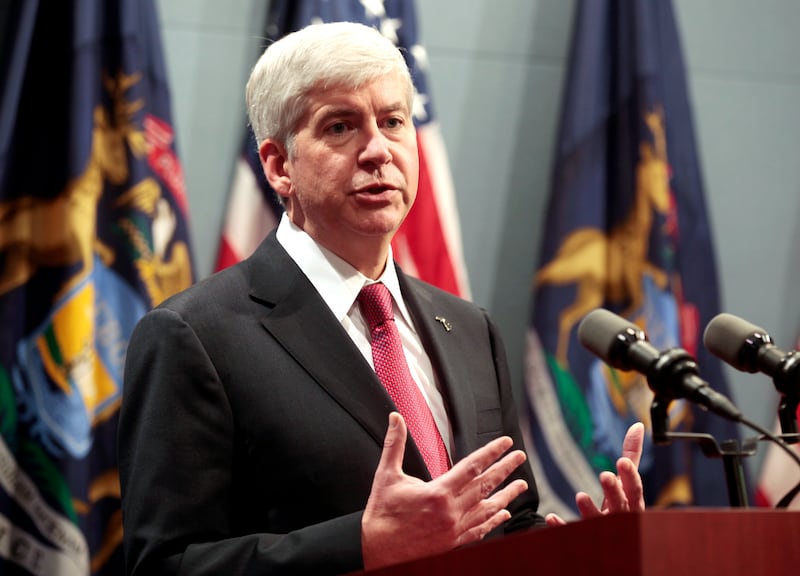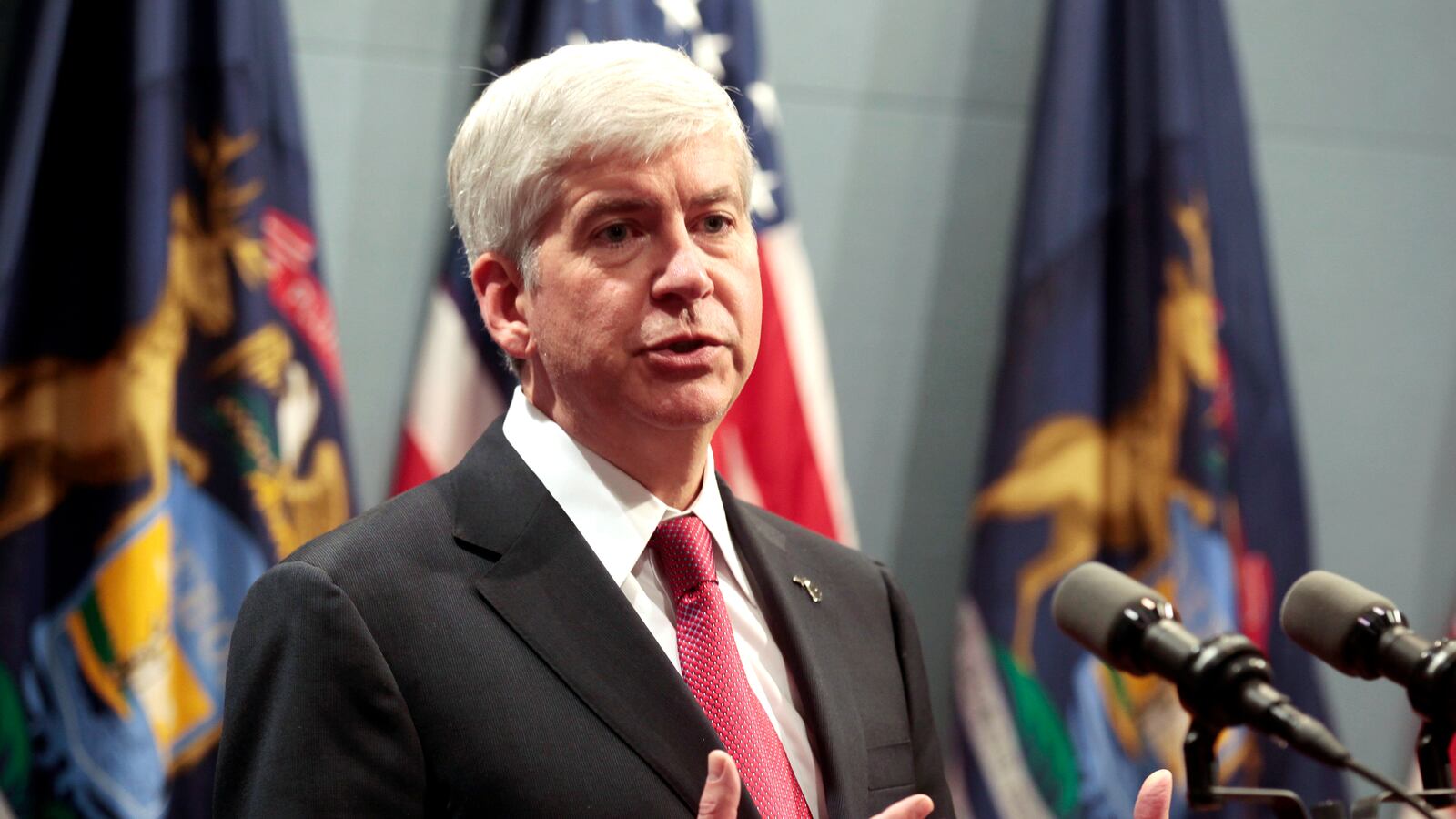So this is what he meant by “One Tough Nerd.”

Michigan’s Republican governor, Rick Snyder, has become public enemy No. 1 among liberals for his controversial decision this week to sign right-to-work legislation in Michigan—the birthplace of the American organized labor movement.
In 2010, he campaigned apart from the Tea Party tide, representing himself as a comparatively centrist technocrat, a CEO, and a CPA who would be relentlessly focused on balancing the state’s budget and improving its business climate. He rose from obscurity—beginning the race with virtually no statewide name recognition—to win office, largely thanks to a great TV ad that aired during the Super Bowl, introducing him as “One Tough Nerd.”
Now Michigan Democrats are calling Snyder a liar, as in State Sen. Gretchen Whitmer’s overheated Huffington Post column calling the legislation “anti-worker, anti-family, and ... anti-American.”
Coverage of the controversy at the state capital in Lansing was equally heated, as union member protesters swarmed the rotunda and circled the building. There were conflicts between the thousands of liberal activists who descended on the capital to protest the legislation, and the relative handful of conservatives there to support it.
Against this backdrop, there was an understandable temptation to replay the script of the divisive Wisconsin battles over Gov. Scott Walker’s approach there to reforming collective-bargaining rights. These fights were also labeled as labor’s last stand.
But the comparisons end at the slogans. Rick Snyder is not Scott Walker. And Michigan is not Wisconsin.
The fight in Wisconsin was over public sector unions’ rights. The fight in Michigan was largely over private-sector unions. This is not an incidental difference.
Public sector unions’ paychecks come from taxpayers—they have a direct impact on the budget. And the controversy in Wisconsin stemmed from Walkers’ attempts to rein in the political power of public-sector unions by removing their ability to automatically deduct union dues from worker paychecks. It was no surprise that he accepted what he thought was a call from the Koch brothers during the controversy.
Scott Walker was nearly recalled over his ideologically driven efforts, though he notably won the recall race in an early test of labor strength versus Super-PACs in a special election. He was celebrated as a partisan warrior by Tea Party backing Super-PACs like Americans for Prosperity and FreedomWorks. While he’s occasional tried to moderate his tone in a transparent attempt to hold on his job, there is no doubt that Scott Walker is an intensely partisan and ideological figure.
Not so with Rick Snyder, despite attempts to paint him with the same broad brush. After all, this is a Republican governor who rejected the Voter ID laws backed by many of his more conservative colleagues, and that were rightly described as voter suppression efforts. When Michigan’s Republican state legislature passed a Voter ID law and sent it to Snyder for his signature this July, he vetoed the bill. While conservatives grumbled, the League of Women Voters celebrated the decision.
Likewise, when the Supreme Court upheld the constitutionality of the Affordable Care Act, Snyder did not join the stampede of Republican governors who announced they would not set up the state exchanges and instead kicked the responsibility back to the federal government in an ironic form of protest. Snyder decided his state would embrace the law in an attempt to cover the uninsured and reduce costs.
Finally, during the campaign, when his chosen candidate Mitt Romney and the other conservative primary candidates blasted the Obama administration’s auto-bailouts, Governor Snyder defended them as reasonable and effective, saying “it did get results.”
There’s no question that on the issue of right-to-work, Rick Snyder was not trying to enhance his moderate appeal in Michigan, especially after the legislation was passed without debate in a lame-duck session, before a few new Democrats join the legislature in January.
But efforts to call the legislation the “end of labor unions” are overwrought. What made the Michigan effort controversial was that the state has the fifth-highest union-membership rate in the nation, at just over 17 percent—but that is down from 40 percent a generation ago.
Beyond the semantics and partisan spin on either side, the legislation means simply that workers cannot be forced to join a union or pay union dues in a union shop. Yes, this can create free-loader problems, when workers benefit from negotiations that they do not pay for. There have been cases in the past, like Oklahoma, where states pass right-to-work laws and lose manufacturing jobs rather than gain them. There are also right-to-work states like Nevada where unions remain powerful.
According to the Bureau of Labor Statistics, unemployment rates in right-to-work states are narrowly lower than in union states—6.9 percent to 7.6 percent. On the flipside, overall wages and benefits are lower in right-to-work states. In nearby Indiana, when Hoosiers passed right-to-work legislation last year, the change was an added inducement for companies looking to relocate.
Snyder has been consistent in following through with his campaign promise to focus on attracting businesses and bringing new jobs to the state. That’s why he brought about a 6 percent flat business tax, putting the industrial state business tax behind only Texas and Florida among the nation’s largest states. He also managed to close a $1.5 billion budget gap without gimmicks and began paying down long-term debt, leading Fitch Ratings to upgrade the state’s outlook to positive.
As a matter of power politics and money, of course labor unions fought tooth and nail to oppose this move that will reduce their coffers in the state that is their spiritual home—and will try to punish the politicians who passed the legislation they fear will sap their coffers and with them their political strength.
But even as President Obama carried the state by nine percentage points, voters split their tickets to reject a high-profile ballot initiative to codify collective bargaining rights in the State Constitution by eight percentage points.
The fight over Right-to-Work legislation in Michigan isn’t over—it will likely be the core fight in Snyder’s 2014 re-election bid. But it is far from certain that this proposal will prove broadly unpopular among Michiganders. Synder’s decision was difficult and controversial but it was driven less by conservative ideology than a pragmatic commitment to bringing more jobs back to Michigan.
That is the mark of one tough nerd.




